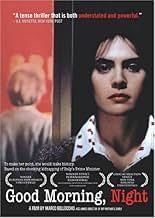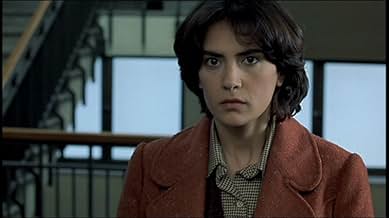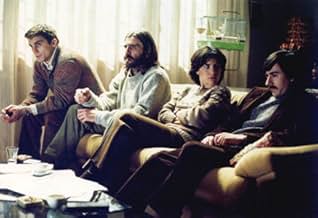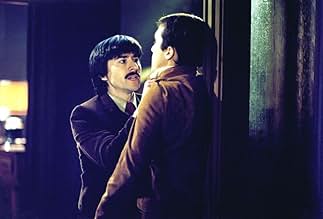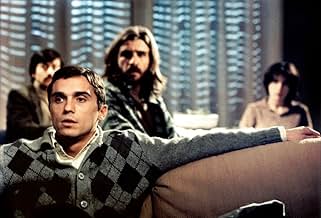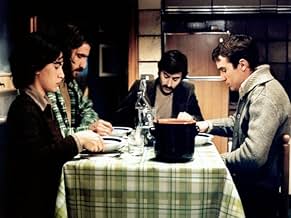Buongiorno, notte
- 2003
- 1h 46min
NOTE IMDb
7,1/10
4,2 k
MA NOTE
Ajouter une intrigue dans votre langueThe 1978 kidnapping of politician Aldo Moro as seen from the perspective of one of his assailants: a conflicted young woman in the ranks of the Red Brigade.The 1978 kidnapping of politician Aldo Moro as seen from the perspective of one of his assailants: a conflicted young woman in the ranks of the Red Brigade.The 1978 kidnapping of politician Aldo Moro as seen from the perspective of one of his assailants: a conflicted young woman in the ranks of the Red Brigade.
- Réalisation
- Scénario
- Casting principal
- Récompenses
- 13 victoires et 21 nominations au total
Giulio Bosetti
- Paolo VI
- (as Giulio Stefano Bosetti)
Avis à la une
Aldo Moro's kidnapping and murder was at its time a huge event for the Italian history and the world. With the recrudescence of terrorism at the beginning of the 70s, some of the extreme left movements in Europe - especially in Germany and Italy - embraced the path of the 'armed struggle', a deformation of the Marxist concept of class struggle in a try to stop the historical reconciliation between the traditional political parties and an Italian Comminist Party already feeling the winds of reform that will melt down the Iron Curtain 10-15 years later.
Marco Bellocchio's film tackles the story from the perspective of the day to day life of the kidnappers, and through the eyes and dreams of one of the kidnappers - the only female in the group. We do not see any of the bloody events of the kidnapping or the outcome, and most of the action happens in the rented flat where the captors kept Moro imprisoned. The director and the splendid main actress Maya Sansa succeed to re-create the political conditioning and the motivations that brought the young woman to join the terrorist fighting path, but also the human dimension that brings her back the feelings of compassion to the victim. It is Aldo Moro's portrait played by Roberto Herlitzka which seems surprinsigly more sketchy, and I had the feeling that a greater message about the relationship between kidnapper and victim was missed.
It is still an interesting movie to watch, minor in style but human, dealing from a different perspective with a theme that too often generated films that were spectacular, but deprived of any true emotion. 8 out of 10 on my personal scale.
Marco Bellocchio's film tackles the story from the perspective of the day to day life of the kidnappers, and through the eyes and dreams of one of the kidnappers - the only female in the group. We do not see any of the bloody events of the kidnapping or the outcome, and most of the action happens in the rented flat where the captors kept Moro imprisoned. The director and the splendid main actress Maya Sansa succeed to re-create the political conditioning and the motivations that brought the young woman to join the terrorist fighting path, but also the human dimension that brings her back the feelings of compassion to the victim. It is Aldo Moro's portrait played by Roberto Herlitzka which seems surprinsigly more sketchy, and I had the feeling that a greater message about the relationship between kidnapper and victim was missed.
It is still an interesting movie to watch, minor in style but human, dealing from a different perspective with a theme that too often generated films that were spectacular, but deprived of any true emotion. 8 out of 10 on my personal scale.
On March 16, 1978, Aldo Moro, the Prime Minister of Italy, was kidnapped by a group of Communist revolutionaries known as the Red Brigade and held in captivity for 55 days. Through letters and photos sent by the kidnappers, the authorities learned that Moro had been given a "trial" by the Red Brigade and sentenced to death for his crimes against the proletariat of Italy - and, indeed, on May 9th of that year, his body was found, riddled with ten rounds of bullets, in the trunk of an abandoned car.
In "Good Morning, Night," writer/director Marco Bellochio takes the events and drains them of much of their sociopolitical significance, choosing instead to focus on the human drama at the story's core. Bellochio looks at the ambivalent feelings and conflicted motives underlying the kidnappers' actions, particularly in the case of an attractive young woman named Chiara (confidently played by Maya Sansa), who comes to question her commitment to "the cause" as the reality of what they are planning to do begins to sink in. It is largely through her eyes that we come to view the events and to see Moro less as an impersonal force to be manipulated for political purposes and more as a simple human being with all the fears, insecurities and desperate desire for life common to us all. Indeed, the political aspects stay largely in the background, relegated mainly to clips of stock footage showing us the principal players of the time dealing with the crisis.
With its dreamy visions, fantasy sequences, and tendency towards wild speculation, the film may frustrate those who would have preferred a more historically accurate, documentary approach to the topic. But Bellochio, as an artist, is less concerned with the "facts" of the case than with exploring the dilemma of the revolutionary's mindset. And to that end, he has done an exemplary job in "Good Morning, Night."
In "Good Morning, Night," writer/director Marco Bellochio takes the events and drains them of much of their sociopolitical significance, choosing instead to focus on the human drama at the story's core. Bellochio looks at the ambivalent feelings and conflicted motives underlying the kidnappers' actions, particularly in the case of an attractive young woman named Chiara (confidently played by Maya Sansa), who comes to question her commitment to "the cause" as the reality of what they are planning to do begins to sink in. It is largely through her eyes that we come to view the events and to see Moro less as an impersonal force to be manipulated for political purposes and more as a simple human being with all the fears, insecurities and desperate desire for life common to us all. Indeed, the political aspects stay largely in the background, relegated mainly to clips of stock footage showing us the principal players of the time dealing with the crisis.
With its dreamy visions, fantasy sequences, and tendency towards wild speculation, the film may frustrate those who would have preferred a more historically accurate, documentary approach to the topic. But Bellochio, as an artist, is less concerned with the "facts" of the case than with exploring the dilemma of the revolutionary's mindset. And to that end, he has done an exemplary job in "Good Morning, Night."
I've read the other comments on this board and I would like to precise that Aldo Moro at the time was not the Italian President and that obviously the Red Brigades were out for his blood because he was working skilfully at a compromise between the Christian Democrats and the Communists and that meant for the extremists of the left to be cut out from any kind of power or hold they might have on the Government. The film itself does not seek to give political answers and is much more concerned with the human aspects of the drama. It's more lyrical than realistic... if you're looking for action or for a docudrama, you should probably go elsewhere.
Based on a novel, the film describes the situation of Aldo Moro during his captivity. There is more than a meticulous realistic point of view given in this film : it tries to figure thoughts and attitudes of the kidnappers, members of brigate rosse. It explores the contradictions of hidden activists who are desperately trying to justify violent actions by the salvation of proletariat and rise of a social justice. They are seen in their loneliness, especially on the affective, emotional side. The psycho-rigidity of their mind is patent, not only in the sententious talks to their prisoner, in a certain desperate naivety to seek echos of their action in public opinion throughout medias, but also in the way they rule relationships. It's not politically that Moro's character strongly opposes to his kidnappers' characters, but rather in the way he's emotionnaly tied to his family (although being a prisonner, he can write letters), while the others seem alienated facing their own families (Mariano pretends to have cut any link to his son, Chiara tries to avoid familial phone calls and meetings, another member is mad about being away of his girl and suffers to be away from her mind and point of view when he sees her). Together, those members don't look like a family of a new kind. Maybe is it the main limit of Bellochio's movie, not to explore the way such an internal and autistic logical builds inside radical groups. But the movie spots a clearly defined place and time, focusing exclusively on elements linked to Moro's detention in a casual apartment (the gunfight of the kidnapping and then the death of the prisonner are seen indirectly throughout television). The strength of the movie is to develop a symbolic aspect with the character of Chiara's colleague (of her cover work) who defends imagination against the brutality of autocratic arbitrary. Almost fantastically, this character seems to guess Chiara's situation, writing a fiction about the events (like the movie we're effectively seeing as spectators) and modifying her feelings : when she realizes how any execution is horrible and unfair (reminding executions of italian partisani of WWII), it's too late and there is no other escape than in her own imagination (dream-like scene that the film also shows us). I believe it's a good and clever way to introduce us into such a historical event (maybe still wounding italian society), imagination. I also like the aspects and details of the movie that describe the importance of christianity in the conscience of the italians (even marxists ones, subconsciously) and critizises the sacrificial consensus into a falsely ineluctable execution but real murder.
Marco Bellocchio takes a lot of chances in his films, examining human behavior in the face of dissension whether political, moral, or emotional. In 'Buongiorno, notte' ('Good Morning, Night') he studies the infamous 1978 kidnapping of Aldo Moro in what would be a situation that would raise as many questions as it gave answers - and it is that quality that Bellocchio has captured in his film.
The facts of the Italian political current in 1978 may not be understood by the general viewer, but suffice it to say that the ruling political party Democrazia Cristiana was challenged by the Red Brigade, the underground terrorists who kidnapped and killed President Aldo Moro in a coups that was eventually destroyed by the reigning powers. That much of a plot is all that is necessary to know. The bulk of the film revolves around the lives of the kidnappers, especially the sole woman Chiara (Maya Sansa) who with her compatriots hid the President in a tiny room with the threat of death, but also were influenced by the writings and conversations with Moro. The whole question of revolution is under close inspection. The story mixes documentary shots with the cinematography in a tasteful way of showing us the elements of the kidnapping and the aftermath. It is the reaction of Chiara to these events and the questioning that can disrupt the political leanings of revolutionaries that makes this story so very meaningful.
The cast is superb: Maya Sansa, Pier Giorgio Bellocchio, Giovanni Calcagno, Luigi Lo Cascio and Paolo Briguglia as the kidnappers, and Roberto Herlitzka as Aldo Moro are convincing and human. The script does have holes in it where formation of ideas and acts and incidents are vague, but it almost seems as though that is the intention of Bellocchio. In political upheaval nothing is black and white if the events are related through individual's eyes rather that through the reaction of the mobs. And this is what makes the film so fine, if a bit hard to follow.
The facts of the Italian political current in 1978 may not be understood by the general viewer, but suffice it to say that the ruling political party Democrazia Cristiana was challenged by the Red Brigade, the underground terrorists who kidnapped and killed President Aldo Moro in a coups that was eventually destroyed by the reigning powers. That much of a plot is all that is necessary to know. The bulk of the film revolves around the lives of the kidnappers, especially the sole woman Chiara (Maya Sansa) who with her compatriots hid the President in a tiny room with the threat of death, but also were influenced by the writings and conversations with Moro. The whole question of revolution is under close inspection. The story mixes documentary shots with the cinematography in a tasteful way of showing us the elements of the kidnapping and the aftermath. It is the reaction of Chiara to these events and the questioning that can disrupt the political leanings of revolutionaries that makes this story so very meaningful.
The cast is superb: Maya Sansa, Pier Giorgio Bellocchio, Giovanni Calcagno, Luigi Lo Cascio and Paolo Briguglia as the kidnappers, and Roberto Herlitzka as Aldo Moro are convincing and human. The script does have holes in it where formation of ideas and acts and incidents are vague, but it almost seems as though that is the intention of Bellocchio. In political upheaval nothing is black and white if the events are related through individual's eyes rather that through the reaction of the mobs. And this is what makes the film so fine, if a bit hard to follow.
Le saviez-vous
- AnecdotesWas appreciated by the relatives of Aldo Moro.
- GaffesNear the end, when Aldo Moro walks away in the deserted street, you can see a multicolored Peace flag in the background. Those flags would decorate Italian streets only in 2003, to oppose the invasion of Iraq.
- ConnexionsEdited from Païsa (1946)
- Bandes originalesMarcia trionfale
(from "Aida")
Composed by Giuseppe Verdi
Performed by Orchestra e Coro del Teatro dell'Opera di Roma
Conducted by Georg Solti
Decca Records, 1962
Meilleurs choix
Connectez-vous pour évaluer et suivre la liste de favoris afin de recevoir des recommandations personnalisées
- How long is Good Morning, Night?Alimenté par Alexa
Détails
Box-office
- Montant brut aux États-Unis et au Canada
- 10 093 $US
- Week-end de sortie aux États-Unis et au Canada
- 2 769 $US
- 13 nov. 2005
- Montant brut mondial
- 4 240 918 $US
- Durée
- 1h 46min(106 min)
- Couleur
- Mixage
- Rapport de forme
- 1.66 : 1
Contribuer à cette page
Suggérer une modification ou ajouter du contenu manquant

